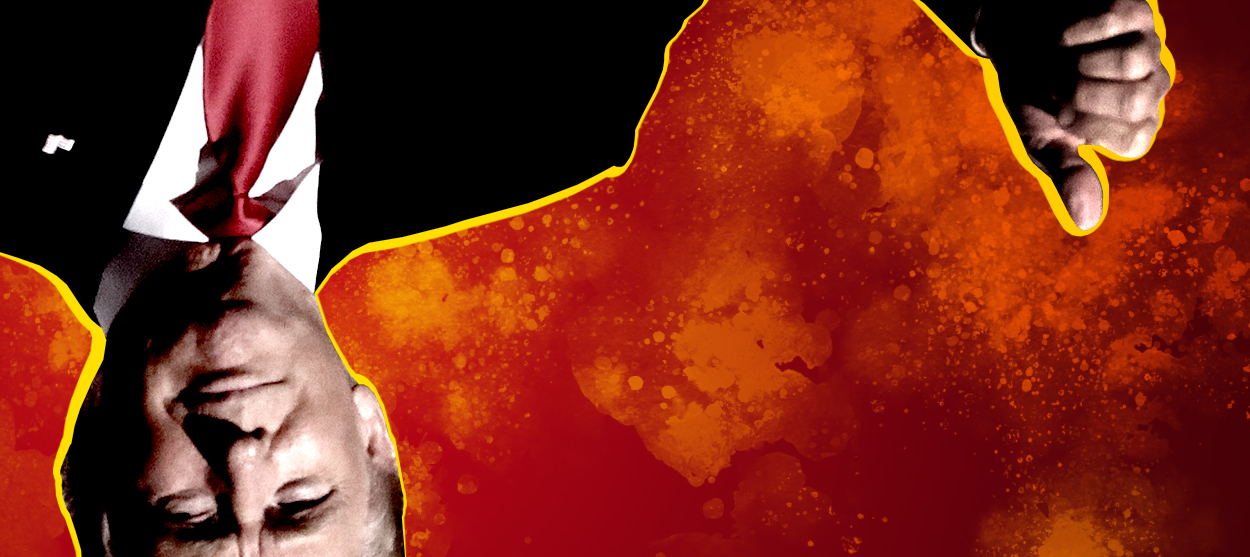Trump is winning the impeachment battle — but losing the war
His impeachment strategy could alienate the voters he needs most in November


A free daily email with the biggest news stories of the day – and the best features from TheWeek.com
You are now subscribed
Your newsletter sign-up was successful
President Trump's lawyers begin presenting their case for why he shouldn't be impeached on Saturday. But we already know what they're going to say.
During Tuesday's procedural battle over whether or not to hear new witness testimony as part of the trial, Trump's defense team gave us a preview of what their arguments will look like: hyperbolic claims, little regard for the truth, strident attacks, and largely ignoring the legal arguments and evidence presented by the House impeachment managers over the last four days. On one level this strategy makes sense, undoubtedly pleasing the combative president and his base, while also reflecting the knowledge that the Senate is exceedingly unlikely to remove Trump from office.
Yet, it carries a risk, threatening to damage perceptions of Trump among the crucial voters who may decide his fate in November.
The Week
Escape your echo chamber. Get the facts behind the news, plus analysis from multiple perspectives.

Sign up for The Week's Free Newsletters
From our morning news briefing to a weekly Good News Newsletter, get the best of The Week delivered directly to your inbox.
From our morning news briefing to a weekly Good News Newsletter, get the best of The Week delivered directly to your inbox.
The House impeachment managers, led by House Intelligence Committee Chairman Adam B. Schiff, have largely spent the first four days of President Trump's trial laying out substantive arguments, explaining in detail why they believe Trump's conduct warrants removal from office. They've used charts and video clips, even rebutting Trump's purported justification for demanding that Ukraine investigate Democratic presidential candidate Joe Biden and his son Hunter. The House managers even dove into substance during battles over amendments to the rules package that will govern the trial.
If that fight over amendments was any indication, what we're about to see from Trump's legal team is going to be jarringly different.
On Tuesday, their rebuttal to each amendment proposed by Democratic Senate Leader Chuck Schumer dripped with incendiary charges focused largely on the impeachment process, not the substance of the arguments against Trump. White House Counsel Pat Cipollone, for example, baselessly asserted, '"A partisan impeachment is like stealing an election."' In so much as they responded to what the House impeachment managers were saying, it wasn't to address or rebut legal contentions, but rather to indignantly upbraid their opposition. On at least three occasions Trump's lawyers outright lied.
Most absurdly, Trump attorney Jay Sekulow apparently misheard what House impeachment manager Val Demmings was saying about Freedom of Information Act (FOIA) lawsuits, and responded by ranting about how it was "a dangerous moment for America when an impeachment of a president of the United States is being rushed through because of lawyer lawsuits."
A free daily email with the biggest news stories of the day – and the best features from TheWeek.com
His attorneys' feistiness no doubt pleased the highly pugilistic president who has been lambasting the unfairness of the House's impeachment process for months. On Wednesday, he sent 142 tweets or retweets, the most of any day during his presidency. In one representative tweet Thursday morning, Trump claimed that the Democrats' presentation was, "loaded with lies and misrepresentations."
Trump aides have long known they are performing for an audience of one, and that the president grades on how strongly his aides defend him and how it looks on television. It was therefore not particularly surprising that the most newsworthy moment of the trial's first three days came in the wee hours of the morning Wednesday, when Chief Justice John Roberts admonished both sides for their heated language and harshness after House Judiciary Committee Chairman Jerrold Nadler sparred with Cipollone and Sekulow, with Cipollone branding Nadler's criticism of the Senate for not agreeing to call witnesses a "power trip" and theatrically asserting, "It's a farce … Mr. Nadler, you owe an apology to the president of the United States and his family, you owe an apology to the Senate, but most of all, you owe an apology to the American people." After all, Trump was in Davos, Switzerland, and as The Washington Post's Paul Kane noted, he might well have been up and tuned in.
Appealing to an audience of one is a luxury that Trump's attorneys and their House allies have. The odds of 20 Senate Republicans joining with all Democrats to remove Trump from office are virtually nonexistent. That frees Trump's team not to focus on legal niceties or rebutting facts, but on stirring up Trump's base, which has long viewed the president as a victim, unfairly targeted by Democrats and the political establishment since his first days in office. As law professor Orin Kerr observed, keeping Trump's base on board will also help keep senators loyal.
But this strategy may prove to be short-sighted. It poses several key risks.
In so much as swing voters — in 2020 likely to be centrists or center-right voters who don't particularly approve of Trump, but likely find the Democratic candidate too far left for their liking — are tuned in, this strategy allows the legal case presented by House Democrats to stand un-rebutted. And the charges lodged against Trump are fairly clear and easy to understand, supported by voluminous evidence being methodically laid out by the House managers. Even if such voters aren't watching the trial on a minute-to-minute basis, they may well see clips of one side presenting facts and evidence, while the other rages and blusters. And the evidence gets at their core fear about Trump: that he's unwilling to abide by safety rails that keep presidents from becoming tyrants and that his behavior is inappropriate for the office.
Additionally, by not challenging the mountain of evidence against Trump, his lawyers risk hardening the determination of Americans who dislike him to turn out in droves — no matter who Democrats nominate. Trump has tried to meddle in the Democratic primary to sow divisiveness, perhaps understanding that thanks to his consistently low approval ratings, he can't afford such determination and high Democratic turnout.
Finally, while most Senate Republicans will side with Trump regardless of the arguments presented, this strategy runs the risk of alienating the handful open to additional witness testimony later in the trial, like Sen. Lamar Alexander. Such testimony could reveal new evidence that damages Trump, while exposing how his administration has fought tooth and nail against it, belying the president's protestations of innocence.
While Trump bears little risk in the trial, his re-election still hangs in the balance. He might even be an underdog. And it wouldn't take much to drive enough Americans to conclude that Schiff was right in closing Thursday's proceedings by declaring," And you know you can't trust this president to do what's right for this country. You can trust he will do what's right for Donald Trump," and right again Friday in charging that "If a president can be so easily manipulated to disbelieve his own intelligence agencies, to accept the propaganda of the Kremlin, that is a threat to our national security." They might well then decide that these realities threaten the country's well being and necessitate a change.
Want more essential commentary and analysis like this delivered straight to your inbox? Sign up for The Week's "Today's best articles" newsletter here.
Brian Rosenwald is a Resident Senior Fellow at the Robert A. Fox Leadership Program at the University of Pennsylvania, co-editor of Made by History at the Washington Post, and author of Talk Radio's America, forthcoming from Harvard University Press in 2019.
-
 Antonia Romeo and Whitehall’s women problem
Antonia Romeo and Whitehall’s women problemThe Explainer Before her appointment as cabinet secretary, commentators said hostile briefings and vetting concerns were evidence of ‘sexist, misogynistic culture’ in No. 10
-
 Local elections 2026: where are they and who is expected to win?
Local elections 2026: where are they and who is expected to win?The Explainer Labour is braced for heavy losses and U-turn on postponing some council elections hasn’t helped the party’s prospects
-
 6 of the world’s most accessible destinations
6 of the world’s most accessible destinationsThe Week Recommends Experience all of Berlin, Singapore and Sydney
-
 Witkoff and Kushner tackle Ukraine, Iran in Geneva
Witkoff and Kushner tackle Ukraine, Iran in GenevaSpeed Read Steve Witkoff and Jared Kushner held negotiations aimed at securing a nuclear deal with Iran and an end to Russia’s war in Ukraine
-
 Kurt Olsen: Trump’s ‘Stop the Steal’ lawyer playing a major White House role
Kurt Olsen: Trump’s ‘Stop the Steal’ lawyer playing a major White House roleIn the Spotlight Olsen reportedly has access to significant US intelligence
-
 Trump’s EPA kills legal basis for federal climate policy
Trump’s EPA kills legal basis for federal climate policySpeed Read The government’s authority to regulate several planet-warming pollutants has been repealed
-
 House votes to end Trump’s Canada tariffs
House votes to end Trump’s Canada tariffsSpeed Read Six Republicans joined with Democrats to repeal the president’s tariffs
-
 Bondi, Democrats clash over Epstein in hearing
Bondi, Democrats clash over Epstein in hearingSpeed Read Attorney General Pam Bondi ignored survivors of convicted sex offender Jeffrey Epstein and demanded that Democrats apologize to Trump
-
 Judge blocks Trump suit for Michigan voter rolls
Judge blocks Trump suit for Michigan voter rollsSpeed Read A Trump-appointed federal judge rejected the administration’s demand for voters’ personal data
-
 US to send 200 troops to Nigeria to train army
US to send 200 troops to Nigeria to train armySpeed Read Trump has accused the West African government of failing to protect Christians from terrorist attacks
-
 Grand jury rejects charging 6 Democrats for ‘orders’ video
Grand jury rejects charging 6 Democrats for ‘orders’ videoSpeed Read The jury refused to indict Democratic lawmakers for a video in which they urged military members to resist illegal orders
